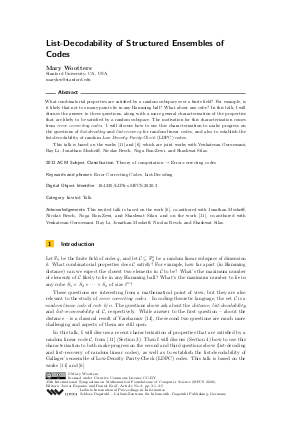List-Decodability of Structured Ensembles of Codes (Invited Talk)
Author Mary Wootters
-
Part of:
Volume:
45th International Symposium on Mathematical Foundations of Computer Science (MFCS 2020)
Part of: Series: Leibniz International Proceedings in Informatics (LIPIcs)
Part of: Conference: Mathematical Foundations of Computer Science (MFCS) - License:
 Creative Commons Attribution 3.0 Unported license
Creative Commons Attribution 3.0 Unported license
- Publication Date: 2020-08-18
File

PDF
LIPIcs.MFCS.2020.3.pdf
- Filesize: 364 kB
- 5 pages
Document Identifiers
Subject Classification
ACM Subject Classification
- Theory of computation → Error-correcting codes
Keywords
- Error Correcting Codes
- List-Decoding
Metrics
- Access Statistics
-
Total Accesses (updated on a weekly basis)
0PDF Downloads0Metadata Views
Abstract
What combinatorial properties are satisfied by a random subspace over a finite field? For example, is it likely that not too many points lie in any Hamming ball? What about any cube? In this talk, I will discuss the answer to these questions, along with a more general characterization of the properties that are likely to be satisfied by a random subspace. The motivation for this characterization comes from error correcting codes. I will discuss how to use this characterization to make progress on the questions of list-decoding and list-recovery for random linear codes, and also to establish the list-decodability of random Low Density Parity-Check (LDPC) codes. This talk is based on the works [Mosheiff et al., 2019] and [Guruswami et al., 2020], which are joint works with Venkatesan Guruswami, Ray Li, Jonathan Mosheiff, Nicolas Resch, Noga Ron-Zewi, and Shashwat Silas.
Cite As Get BibTex
Mary Wootters. List-Decodability of Structured Ensembles of Codes (Invited Talk). In 45th International Symposium on Mathematical Foundations of Computer Science (MFCS 2020). Leibniz International Proceedings in Informatics (LIPIcs), Volume 170, pp. 3:1-3:5, Schloss Dagstuhl – Leibniz-Zentrum für Informatik (2020)
https://doi.org/10.4230/LIPIcs.MFCS.2020.3
BibTex
@InProceedings{wootters:LIPIcs.MFCS.2020.3,
author = {Wootters, Mary},
title = {{List-Decodability of Structured Ensembles of Codes}},
booktitle = {45th International Symposium on Mathematical Foundations of Computer Science (MFCS 2020)},
pages = {3:1--3:5},
series = {Leibniz International Proceedings in Informatics (LIPIcs)},
ISBN = {978-3-95977-159-7},
ISSN = {1868-8969},
year = {2020},
volume = {170},
editor = {Esparza, Javier and Kr\'{a}l', Daniel},
publisher = {Schloss Dagstuhl -- Leibniz-Zentrum f{\"u}r Informatik},
address = {Dagstuhl, Germany},
URL = {https://drops.dagstuhl.de/entities/document/10.4230/LIPIcs.MFCS.2020.3},
URN = {urn:nbn:de:0030-drops-126742},
doi = {10.4230/LIPIcs.MFCS.2020.3},
annote = {Keywords: Error Correcting Codes, List-Decoding}
}
Author Details
Acknowledgements
This invited talk is based on the work [Guruswami et al., 2020], co-authored with Jonathan Mosheiff, Nicolas Resch, Noga Ron-Zewi, and Shashwat Silas; and on the work [Mosheiff et al., 2019], co-authored with Venkatesan Guruswami, Ray Li, Jonathan Mosheiff, Nicolas Resch, and Shashwat Silas.
References
- Mahdi Cheraghchi, Venkatesan Guruswami, and Ameya Velingker. Restricted isometry of fourier matrices and list decodability of random linear codes. In Proceedings of the Twenty-Fourth Annual ACM-SIAM Symposium on Discrete Algorithms, SODA 2013, New Orleans, Louisiana, USA, January 6-8, 2013, pages 432-442, 2013. URL: https://doi.org/10.1137/1.9781611973105.31.
-
Peter Elias. List decoding for noisy channels. Wescon Convention Record, Part 2, pages 94-104, 1957.

- Robert G. Gallager. Low-density parity-check codes. IRE Trans. Information Theory, 8(1):21-28, 1962. URL: https://doi.org/10.1109/TIT.1962.1057683.
- Venkatesan Guruswami, Johan Håstad, and Swastik Kopparty. On the list-decodability of random linear codes. IEEE Trans. Information Theory, 57(2):718-725, 2011. URL: https://doi.org/10.1109/TIT.2010.2095170.
-
Venkatesan Guruswami and Piotr Indyk. Efficiently decodable codes meeting Gilbert-Varshamov bound for low rates. In SODA, volume 4, pages 756-757, 2004.

-
Venkatesan Guruswami, Ray Li, Jonathan Mosheiff, Nicolas Resch, Shashwat Silas, and Mary Wootters. Bounds for list-decoding and list-recovery of random linear codes. arXiv preprint arXiv:2004.13247, 2020. To appear, RANDOM 2020.

- Venkatesan Guruswami and Atri Rudra. Concatenated codes can achieve list-decoding capacity. Electronic Colloquium on Computational Complexity (ECCC), 15(054), 2008. URL: http://eccc.hpi-web.de/eccc-reports/2008/TR08-054/index.html.
-
Brett Hemenway, Noga Ron-Zewi, and Mary Wootters. Local list recovery of high-rate tensor codes & applications. In 2017 IEEE 58th Annual Symposium on Foundations of Computer Science (FOCS), pages 204-215. IEEE, 2017.

-
Brett Hemenway and Mary Wootters. Linear-time list recovery of high-rate expander codes. Information and Computation, 261:202-218, 2018.

-
Ray Li and Mary Wootters. Improved list-decodability of random linear binary codes. In Approximation, Randomization, and Combinatorial Optimization. Algorithms and Techniques (APPROX/RANDOM 2018). Schloss Dagstuhl-Leibniz-Zentrum fuer Informatik, 2018.

-
Jonathan Mosheiff, Nicolas Resch, Noga Ron-Zewi, Shashwat Silas, and Mary Wootters. LDPC codes achieve list decoding capacity. arXiv preprint arXiv:1909.06430, 2019.

-
Atri Rudra and Mary Wootters. Every list-decodable code for high noise has abundant near-optimal rate puncturings. In Proceedings of the forty-sixth annual ACM symposium on Theory of computing, pages 764-773. ACM, 2014.

-
Atri Rudra and Mary Wootters. Average-radius list-recovery of random linear codes. In Proceedings of the 2018 ACM-SIAM Symposium on Discrete Algorithms, SODA, 2018.

-
Rom Rubenovich Varshamov. Estimate of the number of signals in error correcting codes. Docklady Akad. Nauk, SSSR, 117:739-741, 1957.

- Mary Wootters. On the list decodability of random linear codes with large error rates. In Symposium on Theory of Computing Conference, STOC'13, Palo Alto, CA, USA, June 1-4, 2013, pages 853-860, 2013. URL: https://doi.org/10.1145/2488608.2488716.
-
Jack Wozencraft. List decoding. Quarter Progress Report, 48:90-95, 1958.

-
Victor Vasilievich Zyablov and Mark Semenovich Pinsker. List concatenated decoding. Problemy Peredachi Informatsii, 17(4):29-33, 1981.

